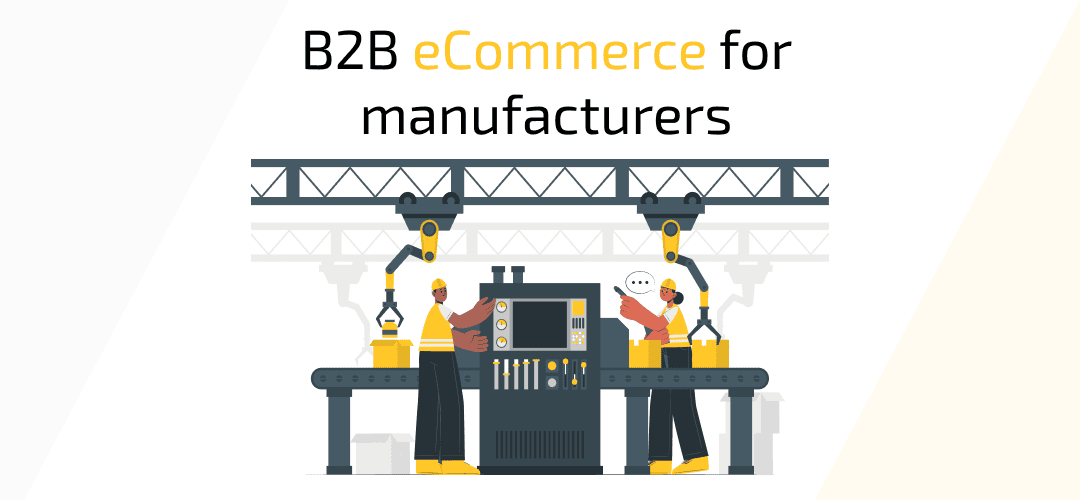
In the pre-eCommerce era the manufacturing industry was shaped by such leading companies as Ford, Samsung, and IBM. From automating production processes and popularizing overlooked technologies to completely revolutionizing the way products are made and sold, they all contributed to this business sphere and still continue to enhance it.
However, established manufacturers can’t process an unlimited number of offline orders, and many are turning to eCommerce to lighten the workload and get an “evergreen” sales channel.
The task becomes even more urgent when the U.S. sales of manufacturers and distributors are slowing down due to economic recession and high-risk inflation. Statista conducted a survey and found out that the U.S. manufacturing sales grew by 13% between 2021 and 2022. The trend slowed down in 2022-2023 (the growth rate fell to 1.8%), but the only channel that seems to be unaffected by hard times is digital commerce.
In this post, we’ll focus on B2B eCommerce for manufacturers, its biggest challenges and technical requirements, take a look at its prospects, and consider some successful case studies of businesses going online.
How does eCommerce for manufacturers differ from that for wholesalers and distributors?
In B2B eCommerce, the needs and requirements of manufacturers, distributors and wholesalers do not look alike. While all these entities engage in online transactions, they utilize different business models and operational dynamics.
Understanding these differences is crucial for choosing the right eCommerce strategies and B2B eCommerce platforms tailored to each sector. Below we highlight some of the biggest differences you should keep in mind:
- Supply chain
- Manufacturers produce and assemble goods. They manage intricate supply chains, source raw materials required for production, and optimize production processes. Thus, digital solutions for manufacturers must support complex inventory management, production tracking, and order fulfillment capabilities.
- Wholesalers focus on buying goods in bulk from manufacturers and selling them to retailers or other businesses. Their eCommerce operations revolve around inventory management, order processing, and supply chain coordination. Wholesalers require robust functionalities to handle large quantities of products, manage bulk orders, and streamline distribution processes.
- Distributors are intermediaries between manufacturers and retailers that make sure final products reach the market. They manage product catalogs, coordinate order fulfillment, and maintain strong relationships with manufacturers and retailers. Distributors require eCommerce platforms that facilitate seamless product catalog management, streamlined order processing, and effective communication with both manufacturers and retailers.
- Pricing and negotiations
- Manufacturers often operate on a pricing structure that considers factors such as production costs, overhead expenses, and desired profit margins. B2B eCommerce solutions for manufacturers should enable custom pricing models, bulk order discounts, and negotiation capabilities to support their pricing strategies.
- Wholesalers negotiate pricing with manufacturers based on the volume of products they purchase. Their eCommerce platforms should allow flexible pricing options and tiered pricing structures.
- Distributors discuss prices with both manufacturers and retailers. They require eCommerce platforms that support complex pricing structures, including volume-based discounts, contract-based pricing, and real-time pricing updates.
- Product catalog management
- Manufacturers have extensive product catalogs, comprising different variations, specifications, and configurations of their offerings. So they need comprehensive product catalog management, including options for presenting detailed product information, product configurators, and variant-based pricing.
- Wholesalers may have a diverse range of products sourced from multiple manufacturers. Their eCommerce platforms need robust product catalog management capabilities, such as bulk product uploading, inventory synchronization, and the ability to handle product variants.
- Distributors manage product catalogs from various manufacturers. Their eCommerce platforms must facilitate efficient catalog management, including product categorization, attribute mapping, and the ability to handle frequent updates from manufacturers.
If manufacturers, wholesalers and distributors consider these key distinctions, they can make informed decisions at each stage of digitizing their businesses. What’s more, considering these specifics is also crucial when selecting a B2B eCommerce platform that aligns with their needs.
To benefit from digital commerce, it’s also important to take into account the biggest challenges faced by eCommerce for manufacturing companies. Below we’ve highlighted those that can make or break it – so make sure to check out this list.
Biggest challenges faced by manufacturing eCommerce
eCommerce for manufacturing is connected with a unique set of challenges that require strategic planning and robust solutions to overcome. Here are the key tasks manufacturers must solve in their everyday digital activities.
- Addressing multiple decision-makers & mitigating partner conflicts: Manufacturers need to communicate with various stakeholders: procurement managers, engineers, financial officers, etc. Thus, the sales process should be tailored to the specific needs and preferences of each group. It is also necessary to avoid possible conflicts between channel partners and DTC customers, offering them both beneficial conditions.
- Handling pricing complexities and offering custom deals: Each customer may have unique pricing agreements, volume-based discounts, or contract-based pricing structures. Managing these complexities requires a flexible pricing framework, effective negotiation strategies, and the ability to handle customized pricing for different customers, without letting each of them know what partnership conditions get the other one.
- Ensuring accurate stock levels and regularly updating them: Manufacturers must have a clear and real-time view of their inventory to avoid stockouts or overstocking since B2B customers often place large orders with specific delivery timelines. Inventory management systems integrated with an eCommerce platform automate stock updates and ensure efficient order processing.
- Guaranteeing timely order fulfillment and shipping: One of the key tasks of manufacturers is to efficiently process orders, manage order queues, coordinate with production units, and ensure on-time delivery. Streamlining order fulfillment processes, integrating with shipping carriers, and utilizing order tracking systems are must-haves to meet customer expectations.
- Keeping up with technology advancements: The eCommerce landscape is driven by technological advancements and changing customer preferences. Manufacturers need to master emerging technologies, for example mobile commerce, artificial intelligence, and personalized user experiences, to provide a seamless and engaging buying experience.
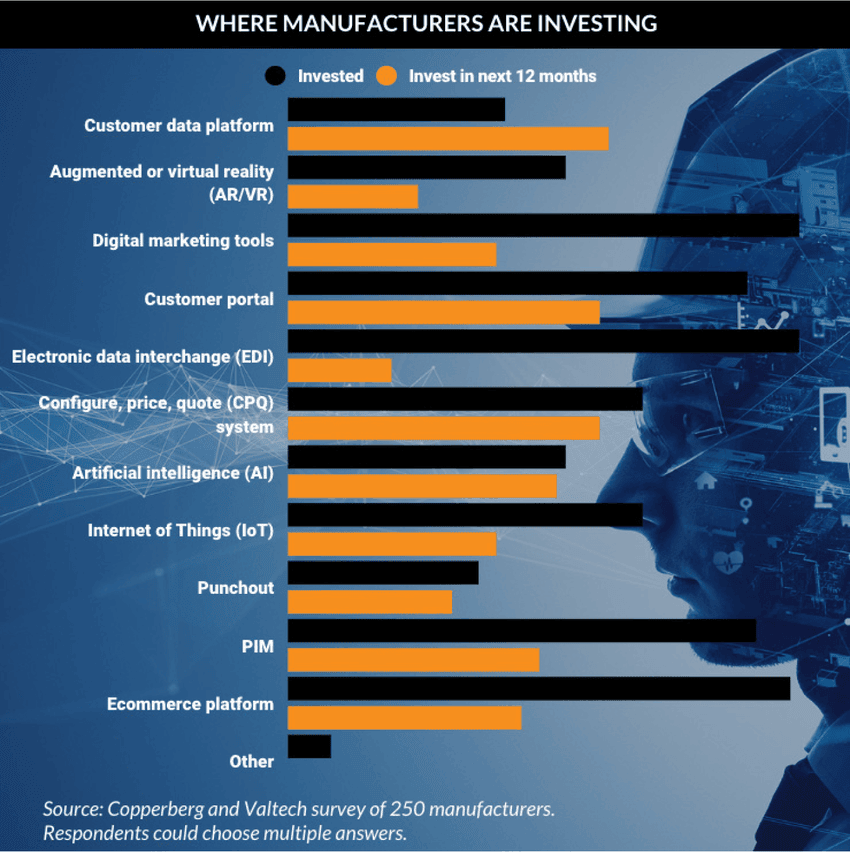
So how can manufacturers address these challenges and optimize their business operations? The obvious answer is to adopt a flexible eCommerce solution for manufacturing that embraces rich functionalities and keeps up with technological advancements.
Best features to find in your B2B eCommerce platform for manufacturers
While there are essential features that apply to eCommerce platforms in general, manufacturers have specific requirements that differentiate them from wholesalers and distributors. Accordingly, the eCommerce solutions they use should have custom functionalities.
Considering these specific needs and challenges, you can select a robust B2B eCommerce platform for manufacturers that will fulfill all the tasks and adapt to the needs of developing business (if you want to see real candidates, check out this round-up of the best B2B eCommerce platforms). In case you prefer a more balanced approach and want to soak yourself into the subject before making a final decision, keep on reading and learn must-have eCommerce features for manufacturers.
Advanced product configuration
Manufacturers often offer customizable products with various options, specifications, and configurations. In this case, your ideal B2B eCommerce platform should be capable of providing advanced product configuration, allowing customers to select and customize products based on their specific requirements.
Custom pricing and quoting
Goods simultaneously sold to wholesalers, distributors and directly to customers require complex pricings based on production costs, materials, and order volume. The chosen eCommerce solution should support custom pricing and quoting (contract-based pricing and volume-based discounts) to different customers.
Powerful inventory management
Inventory management features are useful to track stock levels and prevent stock outs or overstocking. An eCommerce platform for manufacturers should offer real-time inventory tracking, automated stock updates, and low-stock notifications. Manufacturers also need visibility into the production status of orders (i.e. production tracking and order status updates) to provide accurate updates to customers.
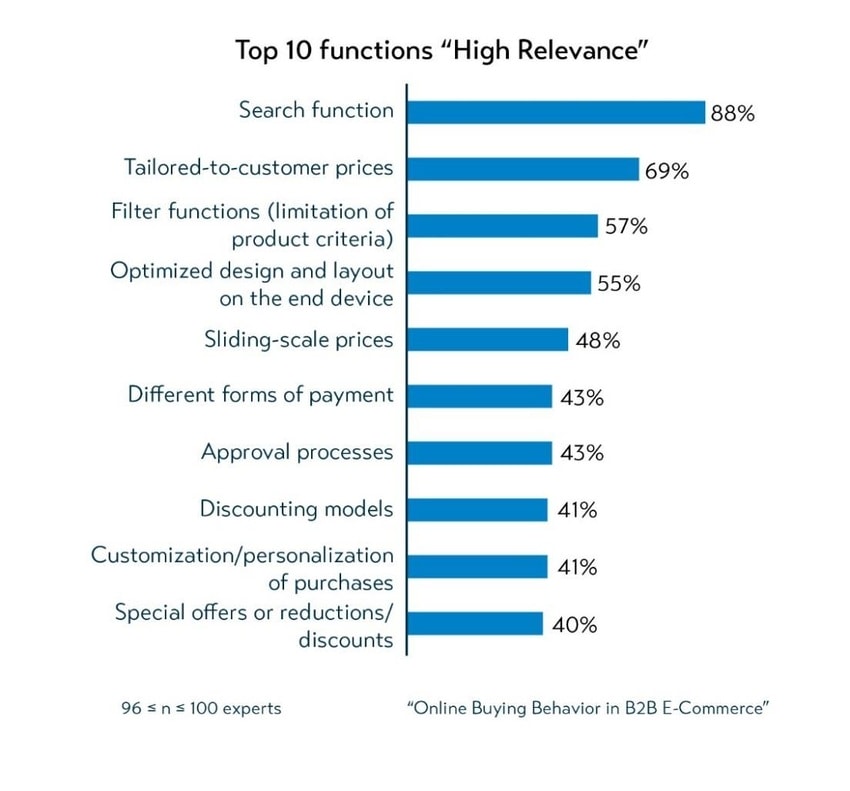
Integration with manufacturing systems
Such integrations enable seamless data flow between the eCommerce platform and production systems, ensuring accurate order processing, inventory updates, and production planning. These systems help eliminate manual data entry and improve overall efficiency.
Comprehensive analytics and reporting
Data-driven insights are essential for manufacturers to make informed business decisions and identify areas for improvement. This refers to information on sales performance, customer behavior, and inventory management. Access to comprehensive reports and analytics empowers manufacturers to optimize their eCommerce strategies and boost sales.
Seeking the perfect B2B eCommerce platform that caters specifically to manufacturers? Look no further than nopCommerce. With its comprehensive toolkit, nopCommerce stands out as a powerful eCommerce platform for manufacturing.
From advanced product configuration and robust inventory management to custom pricing and seamless third-party integration, nopCommerce has it all (and if there’s no feature you search for, you can easily add it due to unlimited customization possibilities).
Discover why nopCommerce is the preferred choice for manufacturers worldwide, and learn how you can elevate your manufacturing eCommerce with nopCommerce.
Case studies: Successful B2B eCommerce implementation by manufacturers worldwide
Manufacturers worldwide need B2B eCommerce solutions to streamline their operations, enhance customer experiences, and drive revenue growth. If you are still considering your options, we’ve prepared two compelling case studies that highlight the successful adoption of nopCommerce by large manufacturing companies.
These real-world examples prove that nopCommerce is among top eCommerce platforms for manufacturing aimed to overcome challenges, expand market reach, and achieve remarkable results in the digital realm.
Take a look at these case studies to gain insights into the transformative power of nopCommerce for manufacturers, and learn how it can help you in your business activities.
New eCommerce website with CMS features
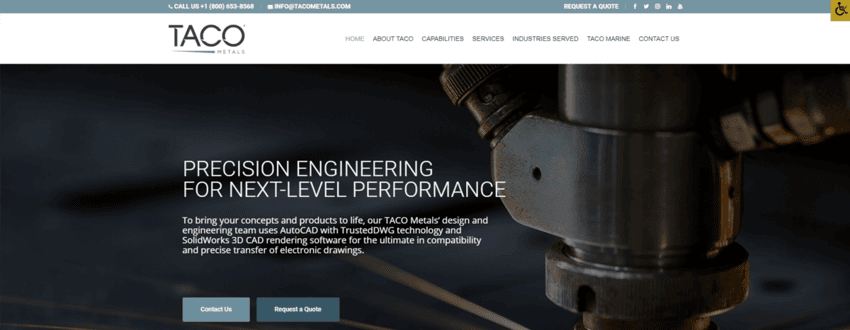
TACO Metals is a leading producer in the marine sector. The company needed a CMS with eCommerce capabilities to create a system that could integrate dealers, distributors, and end users into a single system. Prior to any changes, TACO Metals had been using various online and offline project management systems.
The business built a website on the nopCommerce platform with both eCommerce and CMS functionality to sell its products wholesale to distributors and at retail to customers.
The new website assisted TACO Metals in increasing online sales and generating a higher return on investment. The online store's revenue increased by 30%, time-to-market was shortened by 40%, and its operating expenses decreased by 36% as a result of all the adjustments and updates.
Online store to manage 2 million SKUs
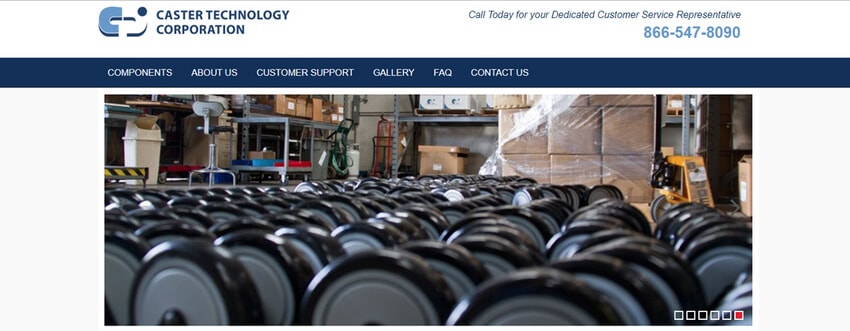
In 1984, Caster Technology was founded in California as a family-owned business. Today, it is a major producer and supplier of wheels, casters, and other related material handling equipment.
The company needed a multi-store solution where the same product can have different specifications in each store because there are hundreds of thousands of caster products and 12 stores operating on a single platform.
The nopCommerce solution partner developed a middle-tier application between the nopCommerce platform and the ERP system, resized and watermarked all images in bulk, streamlined the product database, customized the administration panel, and added an auto-store detect for smaller adjustments to overcome the challenges above and push 2 million SKUs stored in an ERP system to the new store.
The Caster Technology Corporation now has a fully functional online presence that supports multi-store features and is geared toward a global audience.
Final thoughts
For B2B manufacturers, overcoming challenges and leveraging essential features is vital for success in the eCommerce realm. They face challenges in sales, inventory management, and adapting to market dynamics. However, with the right eCommerce platform for manufacturers offering product configuration, third-party integration and tier pricing, it’s perfectly possible to streamline complex operations.
The successful cases we presented above demonstrate a positive impact of platforms like nopCommerce for manufacturers. nopCommerce ensures efficient order processing, seamless production tracking, and personalized customer experiences, resulting in increased satisfaction and sustainable growth.
